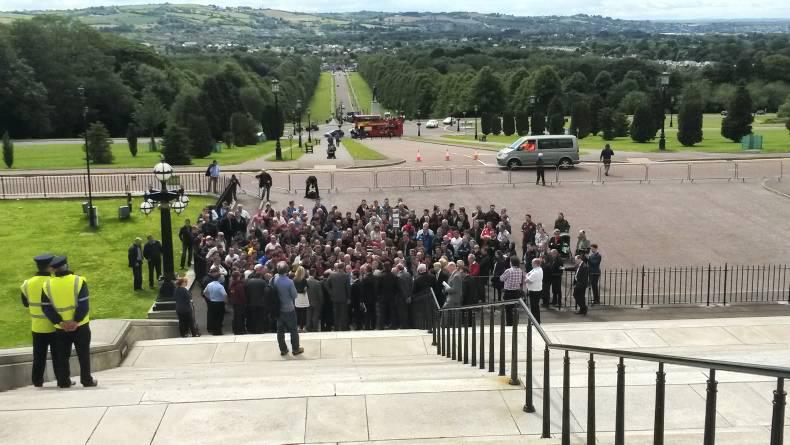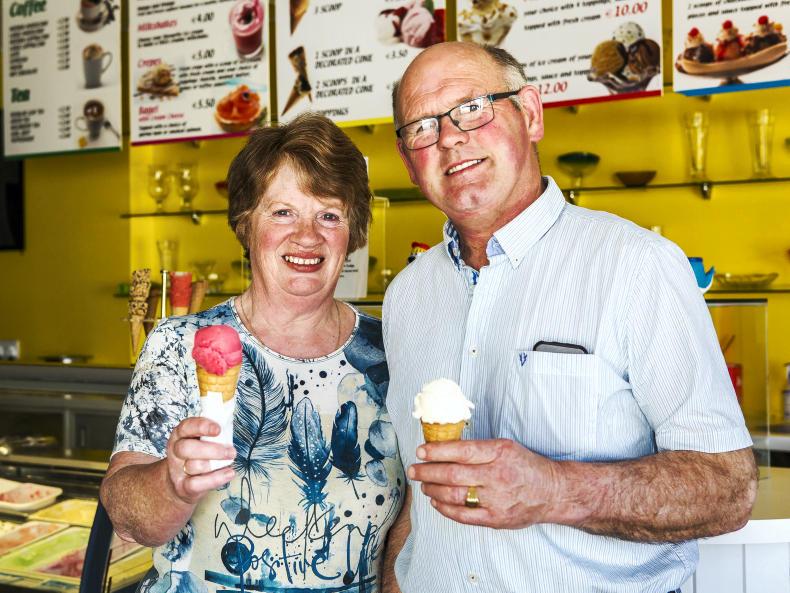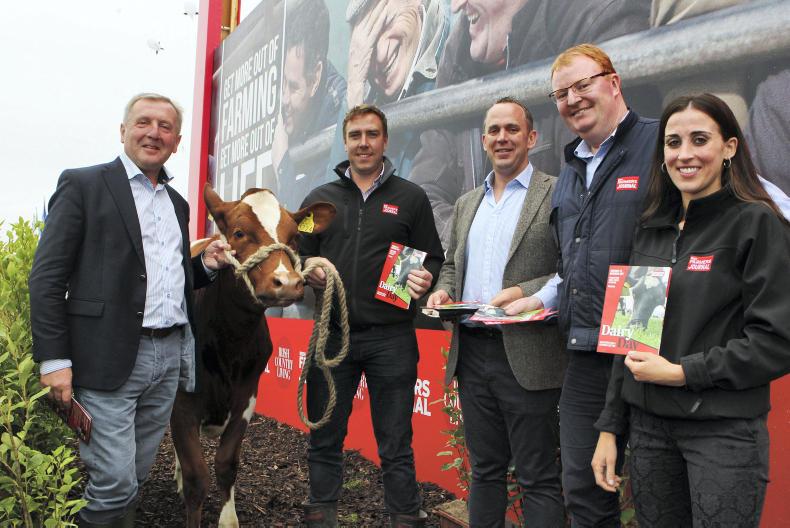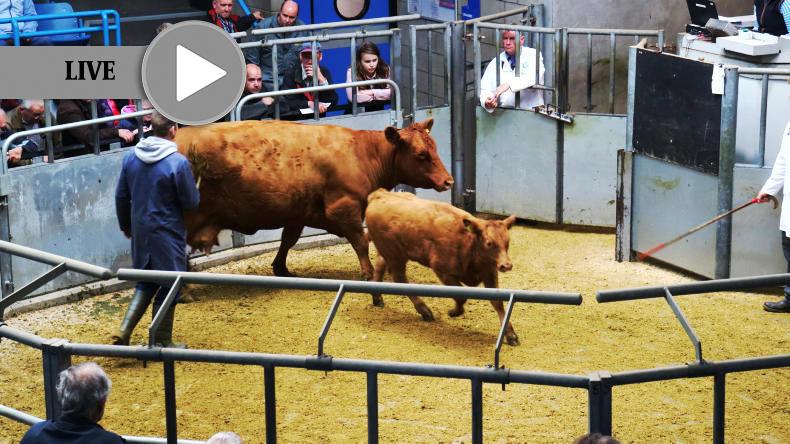Farmers from across Northern Ireland have been asked to make their views known at protests over the coming days.
The first protest is today (Thursday) at the offices of the European Commission in Belfast starting at 12pm. A group of dairy farmers will hand over a letter for the attention of European Commissioner for Agriculture and Rural Development Phil Hogan, ahead of an extraordinary meeting of the EU Council of Agriculture Ministers in Brussels on Monday (7 September). In it, they ask the Commissioner to take action to address the dairy crisis by raising intervention prices and ensuring that superlevy fines worth approximately €700m are used to support the dairy industry.
The group has been formed on the back of a social media campaign under the banner of ‘‘Fair Price Farming NI’’. It has also organised a number of protests at supermarkets in recent weeks and made its views known at a special sitting of the agriculture committee at Stormont at the end of July.
Urging as many dairy farmers as possible to turn up on Thursday, the group maintains that this is “our opportunity to have a voice in this time of crisis”.
The Ulster Farmers’ Union (UFU) is coordinating a demonstration at Stormont at 1pm on Friday, involving the wider agri-food industry. The demonstration has been timed to send a clear message to the European Commission ahead of the Brussels meeting on Monday.
Explaining the choice of venue, UFU president Ian Marshall said he was hopeful of political support and that it reflected an aim to demonstrate without inconveniencing consumers.
“We do not want to be in a situation where Commissioner Hogan sees protests in Dublin, Paris or anywhere else, but not in Belfast – and uses that as a reason to conveniently ignore us,” said Marshall.
The Irish Farmers Journal understands that Marshall met representatives from Fair Price Farming NI last weekend to discuss the possibility of protests. While Marshall wanted to bring together the wider agri-food industry, representatives from Fair Price Farming wanted to concentrate, for now, on the crisis in the dairy sector. The point the organisation makes is that, from an NI perspective, the meeting in Brussels in Monday is about the situation in the dairy sector, not the wider industry. No agreement was reached, hence the two separate events.
Change of position
It represents somewhat of a change of position of the UFU leadership from the dairy crisis summit at Greenmount last Thursday when Marshall questioned how successful protests actually are.
However, by broadening out the focus of the event at Stormont, he has managed to attract support from other parts of the industry, with the NI Food and Drink Association (which represents processors) calling on its members to attend on Friday.
Tony O’Neill, chair of the Agri-Food Strategy Board, has also weighed in with his support highlighting the importance of agri-food to the local economy. “The drop in milk prices alone equates to £220m less spending power this year, compared with last year within our economy, rising to virtually double that amount when beef, cereals and vegetables are included,” he said.
Reading between the lines, there seem to be two main focal points for the UFU-led demonstration:
To highlight to the European Commission the importance of agri-food to the NI economy.To remind local politicians of the importance of having a devolved administration to represent the views and needs of the NI agri-food industry.Meanwhile, the European Milk Board (EMB) and Copa Cogeca, the European umbrella organisation for farming unions, are both organising major farmer protests to descend on Brussels on Monday 7 September to coincide with the Council of Ministers meeting. A sizeable delegation from the UFU is expected to take part in the Copa Cogeca protest. Some dairy farmers from NI are also heading separately to Brussels to join the EMB protest.
Farmers from across Northern Ireland have been asked to make their views known at protests over the coming days.
The first protest is today (Thursday) at the offices of the European Commission in Belfast starting at 12pm. A group of dairy farmers will hand over a letter for the attention of European Commissioner for Agriculture and Rural Development Phil Hogan, ahead of an extraordinary meeting of the EU Council of Agriculture Ministers in Brussels on Monday (7 September). In it, they ask the Commissioner to take action to address the dairy crisis by raising intervention prices and ensuring that superlevy fines worth approximately €700m are used to support the dairy industry.
The group has been formed on the back of a social media campaign under the banner of ‘‘Fair Price Farming NI’’. It has also organised a number of protests at supermarkets in recent weeks and made its views known at a special sitting of the agriculture committee at Stormont at the end of July.
Urging as many dairy farmers as possible to turn up on Thursday, the group maintains that this is “our opportunity to have a voice in this time of crisis”.
The Ulster Farmers’ Union (UFU) is coordinating a demonstration at Stormont at 1pm on Friday, involving the wider agri-food industry. The demonstration has been timed to send a clear message to the European Commission ahead of the Brussels meeting on Monday.
Explaining the choice of venue, UFU president Ian Marshall said he was hopeful of political support and that it reflected an aim to demonstrate without inconveniencing consumers.
“We do not want to be in a situation where Commissioner Hogan sees protests in Dublin, Paris or anywhere else, but not in Belfast – and uses that as a reason to conveniently ignore us,” said Marshall.
The Irish Farmers Journal understands that Marshall met representatives from Fair Price Farming NI last weekend to discuss the possibility of protests. While Marshall wanted to bring together the wider agri-food industry, representatives from Fair Price Farming wanted to concentrate, for now, on the crisis in the dairy sector. The point the organisation makes is that, from an NI perspective, the meeting in Brussels in Monday is about the situation in the dairy sector, not the wider industry. No agreement was reached, hence the two separate events.
Change of position
It represents somewhat of a change of position of the UFU leadership from the dairy crisis summit at Greenmount last Thursday when Marshall questioned how successful protests actually are.
However, by broadening out the focus of the event at Stormont, he has managed to attract support from other parts of the industry, with the NI Food and Drink Association (which represents processors) calling on its members to attend on Friday.
Tony O’Neill, chair of the Agri-Food Strategy Board, has also weighed in with his support highlighting the importance of agri-food to the local economy. “The drop in milk prices alone equates to £220m less spending power this year, compared with last year within our economy, rising to virtually double that amount when beef, cereals and vegetables are included,” he said.
Reading between the lines, there seem to be two main focal points for the UFU-led demonstration:
To highlight to the European Commission the importance of agri-food to the NI economy.To remind local politicians of the importance of having a devolved administration to represent the views and needs of the NI agri-food industry.Meanwhile, the European Milk Board (EMB) and Copa Cogeca, the European umbrella organisation for farming unions, are both organising major farmer protests to descend on Brussels on Monday 7 September to coincide with the Council of Ministers meeting. A sizeable delegation from the UFU is expected to take part in the Copa Cogeca protest. Some dairy farmers from NI are also heading separately to Brussels to join the EMB protest.









SHARING OPTIONS